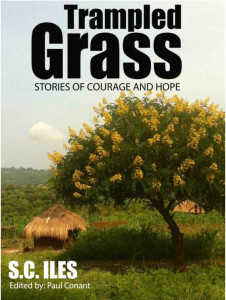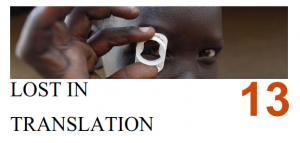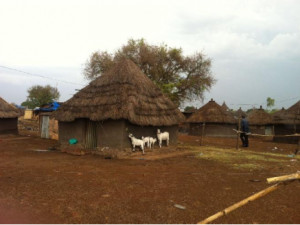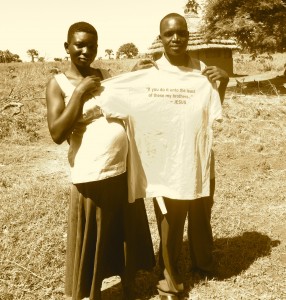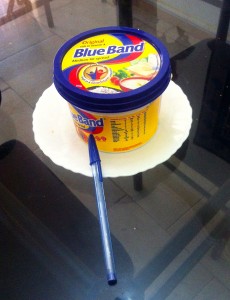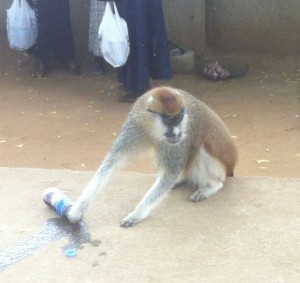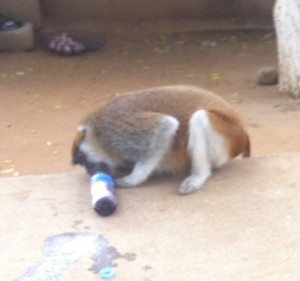We are excited about our new ebook, Trampled Grass. Scroll down to learn how you can have a copy.
A word from Curt
Translation.
Of all my African regrets, not becoming fluent in any language has been the largest. It has humbled me like nothing else.
However, my stumbling around with my tongue has created lots of good stories . . . and new friends.
“Lost in Translation” tells about a memorable translation faux pas.
Daily, we’re posting chapters from our new ebook, Trampled Grass.
If you enjoy the stories, please pass them on.
You can download the entire book as a PDF at www.creekbank.net or as the Snippet App for easy reading on your tablet or phone.
Trampled Grass will be available soon on Amazon.
Our companion video, “We’re All in This Together” is available for viewing at our You Tube Channel.
Blessings on your journey.
Curt Iles
Anakula mbuzi ambako ni amefungwa (Swahili)
“The goat eats where it is tied.”
-Sudanese Proverb [/tweetthis]
Shelter from the storm: Goats in Nimule, South Sudan
I hopped in the back seat of the Land Cruiser as I told Joseph Anyovi, “You sit up front and ride shotgun.”
He turned.
“Ride what?”
“Ride shotgun. It means to . . .”
Our driver, team leader Bob Calvert, shook his head. “Don’t even try to explain it. You’ll never get it across.”
Bob nodded at Joseph. “You sit up front beside me.”
Once again, something I said was lost in translation.
Joseph and Jessica Anyovi on the day before the birth of their first child.
I learned early on: don’t try to tell a joke to Africans.
It just doesn’t translate well.
So I should’ve known better . . . known better than to play a Jerry Clower story in a car of Madi tribesmen.
One of my heroes, Jerry Clower
Three young African friends were riding with me after a full day in the Bush. As we headed back to town, a big goat bounded across the road.
That’s when the plan was hatched.
I knew they’d enjoy Jerry Clower’s “Big Red Goat.”
It’s one of Clower’s shortest (2-minute) tales.
My colleague David Crane had nearly choked on a piece of chicken when I played it for him. It’s a story that always draws a burst of laughter at the punch line.
That is if the listeners understand.
With little introduction, I played “Big Red Goat” for my African friends. They listened with polite attention.
A glance in the rearview mirror assured me they weren’t getting much of Jerry’s strong Southern accent.
They laughed at Clower’s sound effects but the end of the story left them shrugging at each other.
I should’ve known they’d have difficulty. Africans have lots of trouble with American accents, especially the more Southern-fried varieties (like mine and Jerry’s).
That’s why most Americans over here acquire a fake-sounding British English accent. It’s not showing off but an attempt to be understood.
I decided Jerry’s story needed translating. “Guys, let me tell you the background of the story and then I’ll play it again.”
I pull off to the roadside.
“It’s the story of two men who are deer hunting. They come upon a deep hole in the field. Not being able to see the bottom, they throw a stick in.
There’s no sound, so they get a stump and chunk it in. Still no sound.
One of the men sees an eight foot section of railroad track nearby. ‘Let’s throw it in there and I bet we’ll hear when it hits the bottom.’
The two men manhandle the heavy piece before sliding it in the hole. As they wait, a big red goat jumps into the hole.
One of them says, ‘Did you see that?’ ‘Yep, it was a big red goat!’
Just then a man came walking out of the woods. He asks the hunters, ‘Hey fellows, have you seen my big red goat?’
The hunters looked at each other and one answered, ‘Yep, he just jumped into this hole.’
The man said, ‘That’s strange. I don’t see how he could’ve done that when I had him tied to an eight-foot piece of railroad track.’”
I can hear y’all laughing all the way from Doodlefork to Deweyville.
My African friends also laughed. We’ve spent enough time together that they’ve deciphered and decoded my Dry Creek dialect.
I re-played Jerry’s “Big Red Goat” and they seemed to really enjoy it.
I think they pieced together the story from Jerry and me. At least they were polite enough to laugh at the right spots.
If you’re ready for a good laugh (and who isn’t) you can hear Jerry’s version of Big Red Goat.
Learn more about my hero Jerry Clower.
One Last Story on the perils of a Southern Accent in Africa:
Two days ago I went into a northern Ugandan duka(store) to buy a tub of butter. The dominant brand is called “Blue Band.”
I asked the middle-aged clerk, “Dada (Sister), I’d like a container of Blue Band.”
She dutifully returned with a blue ink pen. At least she understood part of my request.
“No. I mean Blue Band.” I used both hands to frame an imaginary butter tub. “Blue- Band-Butter.”
She twirled the pen in her hand.
“BlueBlandButter. I mean, BooBandButter.”
An Ugandan standing beside me said, “He wants Blue Band.”
The clerk went straight to the shelf and returned with my butter.
Blue Band and a Blue Pen
The three of us had a good laugh.
My tongue had made us two more friends.
They have a saying in Africa:
Q. “Do you know what you call a Westerner who can’t laugh at himself?”
A. “Gone.”
Question: What is your favorite Jerry Clower story? Comment below.
*Disclaimer: no animals (goats, kids, or monkeys) were harmed in the making of this story.
Street monkey in Juba, South Sudan. “If only I had an opposable thumb, I’d be king of the hill.”
Follow us on
Curt’s Facebook
Enjoy our Boards on Pinterest
Twitter: @curtiles #UpCountry #goChadan
 Creekbank Stories Curt Iles, Storyteller
Creekbank Stories Curt Iles, Storyteller
